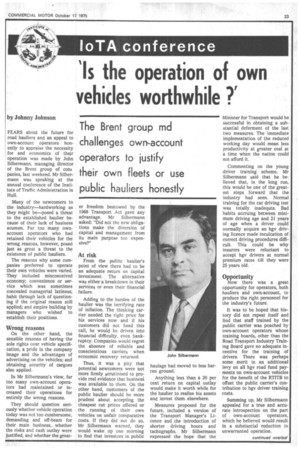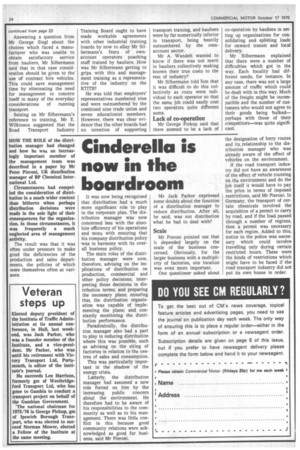'Is the operation of own vehicles worthwhile ?'
Page 25

Page 26

If you've noticed an error in this article please click here to report it so we can fix it.
by Johnny Johnson
FEARS about the future for road hauliers and an appeal to own-account operators honestly to appraise the necessity for and economics of their operation was made by John Silbermann, managing director of the Brent group of conk panies, last weekend. Mr Silbermann was speaking at the annual conference of the Institute of Traffic Administration in Hull.
Many of the newcomers to the industry—hardworking as they might be—posed a threat to the established haulier because of their lack of business acumen, Far too many ownaccount operators who had retained their vehicles for the wrong reasons, however, posed just as great a threat to the existence of public hauliers.
The reasons why some companies preferred to operate their own vehicles were varied. They included misconceived economy; convenience or service which was sometimes concealed managerial laziness; habit through lack of questioning if the original reason still applied; and empire building by managers who wished to establish their positions.
Wrong reasons
On the other hand, the sensible reasons of having the sole rights over vehicle specification, a pride in the company image and the advantages of advertising on the vehicles; and obtaining security of cargoes also applied.
In Mr Silbermann's view, far too many own-account operators had maintained or increased their operations for entirely the wrong reasons.
They should question seriously whether vehicle operation today was not too cumbersome, demanding and off-beam for their main business,, whether the risks and cash outlay were justified, and whether the great er freedom bestowed by the 1968 Transport Act gave any advantage. Mr Silbermann asked: "Did not the new obligations make the diversion of capital and management from its main purpose too expensive?"
At risk
From the public haulier's point of view there had to be an adequate return on capital investment. The alternative was either a breakdown in their services or even their financial failure.
Adding to the burden of the haulier was the terrifying rate of inflation. The thinking carrier needed the right price for his services now and if his customers did not heed this call, he would be driven into financial difficulty, even bankruptcy. Companies would regret the absence of reliable and conscientious carriers when economic recovery returned.
Thus, it was a pity that potential newcomers were not more firmly scrutinised to provide real evidence that business was available to them. On the other hand, customers of the public haulier should be more prudent about accepting the cheapest cut prices offered or the running of their own vehicles on unfair comparative costs. If they did not do so, Mr Silbermann warned, they .would wake up one morning to find that investors in public haulage had moved to less barren ground.
Anything less than a 20 per cent return on capital outlay would make it worth while for the haulier to realise his assets and invest them elsewhere.
Measures proposed for the future, included a version of the Transport Manager's Licence and the introduction of shorter driving hours and tachographs. Mr Silbermann expressed the hope that the Minister for Transport would be successful in obtaining a substantial deferment of the last two measures. The immediate implementation of the reduced working day would mean less productivity at greater cost at a time when the nation could not afford it.
Commenting on the young driver training scheme, Mr Silbermann said that he believed that, in the long run, this would be one of the greatest steps forward that the industry had seen. Normal training for the car driving test was totally inadequte. Bad habits accruing between minimum driving age and 21 years of age when a driver could normally acquire an hgv driving licence made inculcation of correct driving procedures difficult. This could be why insurers were reluctant to accept hgv drivers at normal premium rates till they were 25 years old,
Opportunity
Now there was a great opportunity for operators, both hauliers and own-account, to produce the right personnel for the industry's future.
It was to be hoped that history did not repeat itself and find that staff trained by the public carrier was poached by own-account operators whose training boards, other than the Road Transport Industry Training Board gave no adequate incentive for the training of drivers. There was perhaps some merit in an additional levy on all hgv road fund payments on own-account vehicles for the benefit of the RTITB to offset the public carrier's contribution to hgv driver training costs.
Summing up, Mr Silberrriann appealed for a true and accurate introspection on the part of own-account operators, which he believed would result in a substantial reduction in unwarranted operation. continued from page 23 Answering a question from Mr George Siegl about the choices which faced a manufacturer who was unable to obtain satisfactory service from hauliers, Mr Silbermann said that in that case consideration should be given to the use of contract hire vehicles. This could save management time by eliminating the need for management to concern itself in many of the everyday considerations of running transport.
Seizing on Mr Silbermann's reference to training, Mr E. Wilkinson suggested that the Road Transport Industry Training Board ought to have made workable agreements with other industrial training boards by now to allay Mr Silbermann's fears of ownaccount operators poaching staff trained by hauliers. How was Mr Silbermann getting to grips with this and management training as a representative of the industry on the RTITB?
He was told that employers' representatives numbered nine and were outnumbered by the combined nine trade union and seven educationist members. However, there was clear evidence that the other boards had no intention of supporting transport training, and hauliers were by far numerically inferior in transport, being heavily outnumbered by the ownaccount sector.
Mr A. Wandelt wanted to know if there was not merit in hauliers collectively making known their true costs to the rest of industry?
Mr Silbermann told him that it was difficult to do this collectively as costs were individual to each operator so that the same job could easily cost two operators quite different sums.
Lack of co-operation
Mr George Pickup said that there seemed to be a lack of co-operation by hauliers in setting up organisations for consolidating and splitting loads for onward transit and local delivery.
Mr Silbermann explained that there were a number of difficulties which got in the way. Each locality had different needs, for instance. In any case, there was not a large amount of traffic which could he dealt with in this way. Much of the freight might be incompatible and the number of customers who would not agree to their goods being bulked— perhaps with those of their competitors—was quite significant.
































































































